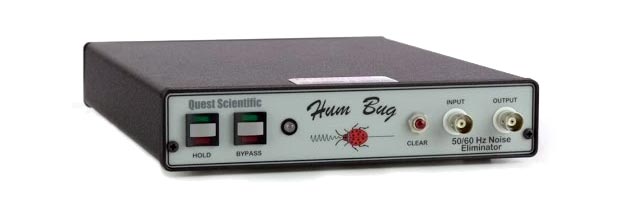
Hum Bug
ELIMINATES ELECTRICAL INTERFERENCE
- Simple 50/60 Hz Sine Waves
- Mixtures of 50/60 Hz Harmonics
- Noise Spikes From Dimmers
- Complex Noise From Fluorescent Lamps
NO WAVEFORM DISTORTION
- No Frequency Loss
- No DC Voltage shift
- No Signal Attenuation
- No Phase Error
A POWERFUL NEW APPROACH TO NOISE CONTROL
The Hum Bug uses an advanced technology to eliminate electrical interference from analogue signals without any signal degradation.
PROBLEM: Signals recorded using biological an other high impedance devices are often contaminated with 50/60* Hz noise and harmonics originating from power supplies, power mains and lights. The presence of noise corrupts the information content of these signals an can degrade the quality of subsequent data analysis. This electrical interference is notoriously difficult to remove without altering the original signal embedded within the noise.
In theory, proper attention to grounding and appropriate shielding can eliminate electrical interference. In practice, noise remains a frequent and distressing problem in the daily operation of many laboratories. Even with diligent attention to details, noise may come and go for no apparent reason and may appear during critical phases of data collection. The effort required to maintain noise at an acceptable level is both time consuming and frustrating.
The Hum Bug solves these problems.
TRADITIONAL APPROACH: Faraday cages decrease the magnitude of environmental noise sources but this protection is often incomplete and working within a cage can be cumbersome. Notch or comb filters are occasionally used to suppress 50/60 Hz noise and harmonics but these filters will distort the input waveform if frequency components of the signal overlap with the filtered frequencies.
NEW SOLUTION: Quest Scientific has developed a powerful new technique to eliminate 50/60 Hz noise and harmonics from analogue signals without filtering. The Hum Bug constructs a noise replica in real time and continuously subtracts this replica from the input signal. It performs this function in the presence of biological activity even when noise characteristics evolve over time.
ADVANTAGES: The Hum Bug is not a filter. It does not create phase delays, amplitude errors, DC shifts or waveform distortion. It eliminates 50/60 Hz noise and harmonics without altering the frequency characteristics of the input signal even when these frequencies overlap with noise components.
SIMPLICITY: The Hum Bug is a real-time device. Simply connect it between your preamplifier and any analysis or recording equipment (oscilloscope etc..). It will automatically eliminate electrical interference whilst letting the signal of interest pass through unchanged. No settings or adjustments are required. The front panel switches are only used if you wish to bypass cancellation (BYPASS), stop the adaptation process (HOLD), or clear the noise replica (CLEAR).
Specifications
TECHNICAL OVERVIEW
THEORY OF OPERATION: Principle operations of the Hum Bug are illustrated on picture 1. All functions occur in parallel as the signal passes in a direct analogue path between input and output. The key innovation developed by Quest Scientific is the ability to effectively isolate noise from an input signal even when noise characteristics are evolving and frequency components of the noise and input signal overlap.
FREQUENCY RESPONSE: Biological signals pass through the Hum Bug unchanged for Frequency components in the range of DC to greater than 500 kHz.
COMPLEX NOISE: Electrical interference often generates a mixture of harmonics at multiples of 50/60 Hz (e.g. 100Hz, 150 Hz, 200 Hz). The Hum Bug eliminates all harmonics with Frequencies up to several kHz. Therefore, even in the complex spikes generated by dimmers and fluorescent lamps are eliminated.
APPLICATIONS: The Hum Bug can eliminate 50/60 Hz noise from virtually any analogue signal. It is equally effective at removing noise associated with inadequate grounding, ground loops, and electrical pick up. Common applications include noise elimination from signals recorded using microelectrodes, skin electrodes (EKG, EMG, EEG), high gain amplifiers, magnetic sensors and audio equipment.
Physical Specifications
Shielded steel instrument box with cast aluminum base
W 6.5" D 7.5" H-1.3" (32,2 × 18.1 × 3.1 cm)
Weight 6 lbs (2.75 kg)
Input Voltages
Input protection: 50 V peak to peak
Maximum input signal: 5 V average peak to peak
Maximum noise amplitude 1 V peak to peak
Frequency Response
Noise cancellation: 50/60 Hz and harmonics up to 4 kHz
Controls
BYPASS: halts noise cancellation
HOLD: suspends adaptation to evolving noise
CLEAR: clears the noise replica
Display
LED indicates changing noise levels
GREEN: decreasing amplitude of the noise replica
RED: increasing amplitude of the noise replica
